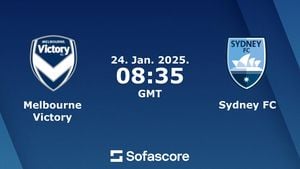A recent study published highlights the significant effects of a one-week intense training sports camp on the anthropometric characteristics of young volleyball players, aged approximately 18 years. The research, conducted by a team from the University of Warmia and Mazury, reveals notable improvements in body composition, including decreased body fat and increased muscle mass, but no considerable enhancements in motor abilities except for grip strength.
The study involved 13 male players from the AZS UWM Olsztyn club, who were closely monitored during their participation at the camp. Utilizing advanced bioelectrical impedance measurement methods, the research found significant decreases of 1.0 kg in body fat mass and 1.16% in percent body fat, alongside increases of 1.0 liters of total body water and 0.9 kg of skeletal muscle mass.
The anthropometric evaluations demonstrated marked improvements; players were observed to lose fat mass but gain lean mass during the week-long training program. Specifically, the waist-to-hip ratio also improved, indicating positive changes in body composition.
While the alterations to body fat percentages were promising, motor performance tests reflected limited results. Significant increases were recorded only for left-hand grip strength, increasing from 51.46 kg to 54.08 kg post-camp, indicating possible benefits of the training regimen but little else for overall motor proficiency.
The findings contribute to the existing body of knowledge concerning how short-term intensive training impacts young athletes, especially volleyball players. Volleyball is characterized by intermittent high-intensity activity requiring both anaerobic and aerobic conditioning. Therefore, monitoring changes to body composition can provide important insights for coaches and trainers developing personalized training programs aimed at enhancing performance.
This research aligns with previous studies indicating strong correlations between athletes' body composition and their motor skills; it emphasizes the importance of optimal body composition for successful sport participation.
It is important to highlight the necessity for longer training periods when implementing changes to improve motor abilities effectively, as noted by the research which suggests improvements typically require sustained training programs lasting more than ten weeks.
The study advocates for integrating short-term sports camps with longer-term training to maximize both anthropometric and motor development effectively. The ability to assess and tailor training programs based on these findings could greatly benefit young athletes as they seek to improve their performance during competitions.
Given the collective results from the study, it’s evident one week of comprehensive training can influence young volleyball players' body composition significantly, though it may not elicit substantial advances in all motor abilities. This insight is invaluable for future training paradigms aiming to cultivate both physical conditioning and skill performance, as coaches can focus their strategies on achieving balanced athlete development.



